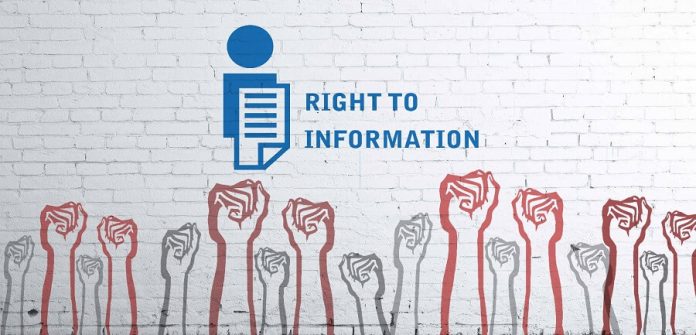This article is written by Priyanka Cholera, from MKES College of Law.
Guest Speaker – Mr. Gagan Gandhi is Managing Partner at NitiNyaya Law Offices, before Practicing law, he was working with the American Express in the Risk and Information Department.
Host – Sammanika Rawat is the Placement Head at Lawsikho.
What is information under the right to information Act?
The information under the right to information Act is any material which can be accessed from the public authority, it is very important to know what comes under the purview of definition of information, material such as documents, notes, extracts, samples e.g. you have the right to know the quality of the road that is being constructed, Recordings of the parliament sessions, etc can be under the purview of information.
What are the reasons for the implementation of the Act?
Mr. Anand explains why the then government intended this Act to be both the sword as well as the shield for itself. Corruption and Scandals like Coal Scam, 2G scam, International Pressure by Investors for transparency and their insistence on the priority of justice. Local bodies also had put pressure on the government for the same. The fundamentals of this Act are sourced from three main Articles i.e. Article 14, 19 and 21 of the Indian constitution.
What is the objective of the Act?
The objectives are to empower citizens, because the information is power, to promote transparency and accountability in the existing system in all government executed projects e.g. what the amount invested in the project is? All such questions can be answered with the help of the Act, second is transparency and accountability, for instance, no one needs to beg or plead any government official for information they have right to know also to encourage people to participate in democracy, people and truly be watchdogs of democracy, as bureaucrats will know they are under observation of citizens. All of this will help curbing of corruption. Mr. Gagan insisted on usage of the Act as a tool to help courts and save time on evidence collection.

Where is the Act applicable?
It is applicable at Ministries and Public Authorities i.e. all authorities that are financed and controlled by the Government, such as Civic Authorities, Police Department, Passport Department, Government Banks, Railway, Metro, PSU, PMO etc. There are some authorities which are quasi Government because they use the structure of government. Still, they do not come under the purview of the Act such as Tata Power. In Mr. Gagan’s opinion the exclusion of charitable trust as is a fallacy, political parties were also accountable under the Act before they were ruled out by a judgment. NGO which are funded by the government also come under the purview of the act provided they are not registered as Trust. Co-operative societies are also included. Tenders also are available after the contract is delivered and expired.
Who is exempted from the RTI Act?
Intelligence bureau due to sensitive information, ministry of home affairs, directorate of revenue intelligence under the ministry of finance, research & analysis wing (RAW), office of MP/MLA public charitable trust, CBI, all of the above authorities and ministries are exempted from revealing information, except in the cases of corruption. Trade secrets, intellectual property, any information that can endanger someone’s life is also exempted. The third party information is also exempted. Often these exemptions are misused to shield the government from revealing the rightful information from the public.
What is the procedure to file an RTI Application?
One can file through Post (available through Post Office) advisable to send through Speed post as one can Track it and know about the delivery of the same or through electronic means, Post can be sent in any language Hindi, English or the Vernacular Language of the region, the fees are very nominal i.e. Rs. 10, it can be paid through cash, pay order or through online portals, after the filing of the application the information is supposed to be provided within 30 days of filing.
What if the information is not provided within 30 days?
If the information is not received by the applicant, he/she can file an appeal for it before the first appellate authority, stating the concern as “My information is provided within 30 days, so you are hereby requested to kindly provide the information within the 30 days”, in case one still doesn’t receive information even after the appeal within 45 days, then the remedy is to apply to second appellate stage, which is the central information commissioner or the state information commissioner within 90 days.
Which information is available to the applicant?
The following information is available to the applicant: a) Status of application pending before any department or ministry, b) Action taken for the complaint one has filed, complaint could be against any officer, project, non functioning of the public servant, etc. c) the records of the government department including but not limited to, revenue records, sanctioned building plans, layout plans, d) status of projects like fundings, contractor, progress etc.
What are the provisions used to withhold the information?
The Section 123 and 124 of Indian Evidence Act, gives power to state withhold information, The atomic energy Act 1912 prohibits the release of information which is strategic to the country, the central civil services Act where you cannot seek certain information that are prohibited to disclose, the officials secrets Act 1923, that protects confidential information from being released.
What are the landmark judgments related to the RTI Act?
The following are the landmark judgments and its significance- MP high court passed the judgment in case of Smt. Sunita Jain Vs Pawan Kumar Jain, that a wife has right to know about her husband’s salary, it cannot be exempted under Section 8 of the RTI Act; Every student has the right to procure his answer sheet, and question his marks including the competitive exam candidates, this judgment was given in the case of UPSC vs Agnesh Kumar.
What are the recent amendments in regards to the Act?
The recent amendments have been regarding the power to fix the tenure and salary of the information commissioner of state and central, the government has proposed to change the Fix Five year Tenure.
What are the challenges faced by the public information officer?
Often the complaint filed is will ill intention if harassing the authority, not in public interest, the overburdened system, lack of staff, lack of proper record-keeping system, no strict penal provision causing unproductivity because there is no fear of consequences, First Appellate authority there is no provision to impose any punishment on Junior Subordinate officer and same concept prevails in Second Appellate Authority, as the amount for causing delay of applications is as low as Rs.250 a day. The natural bias caused by the First Appellate Authority being senior to Public information officers, the information officers are appointed are bureaucrats; hence it’s expected of them to be prudent in the subject. It would be highly efficient to appoint an independent officer, like a Judiciary, not related to the executive.
How should the RTI be drafted?
Mr. Gagan shares from personal experience that the application has to be drafted very carefully because if the information is not delivered within the expected time period has passed, it delay may defeat the purpose of filing it, It is also advisable to add ‘What’ instead of ‘How’. E.g. ‘What has the money been spent on?’ instead of ‘how the money has been spent’, the chances of the former attracting replies are higher, as one cannot expect the authority to create information. If some information is unavailable, then the applicant cannot harass the authority on creating it. Additionally, the disadvantage for the officials to entertain a question beginning from ‘why’ is, that there is no satiable reply for the applicant.
What changes can be made for better efficiency and functioning?
Arranging video conferencing for hearings at both Stages of Appeals discussed earlier; as the result of conduct being recorded, the officers might be more sympathetic towards the appellant. A personal hearing is optional at the first appellate stage which should be made mandatory. Inviting people from varied backgrounds other than bureaucracy, hefty penalty on applicants for filing irrelevant applications to avoid frivolous applications and harassment, implementation of Section 188 of IPC criminal prosecution for No- Reply cased or ambiguous reply and at both stages discussed above.
(Questions from the audience)
If you don’t know which department to write to, what is the substitute?
It is essential to know the department to avoid delay, as one subject matter can concern multiple departments and the concerned authority might not receive it. Even if the applicant does not guess the right department, under Section 6 (3) of the RTI Act, the department which received the application is bound to forward it to the concerned department.
Can the third party ask for information related to any case under the RTI?
There is a provision for third party information, according to it, the concerned officer will write to the third party and ask him his permission and the information will be unveiled depending on the third party’s decision.
LawSikho has created a telegram group for exchanging legal knowledge, referrals and various opportunities. You can click on this link and join:
 Serato DJ Crack 2025Serato DJ PRO Crack
Serato DJ Crack 2025Serato DJ PRO Crack










 Allow notifications
Allow notifications


